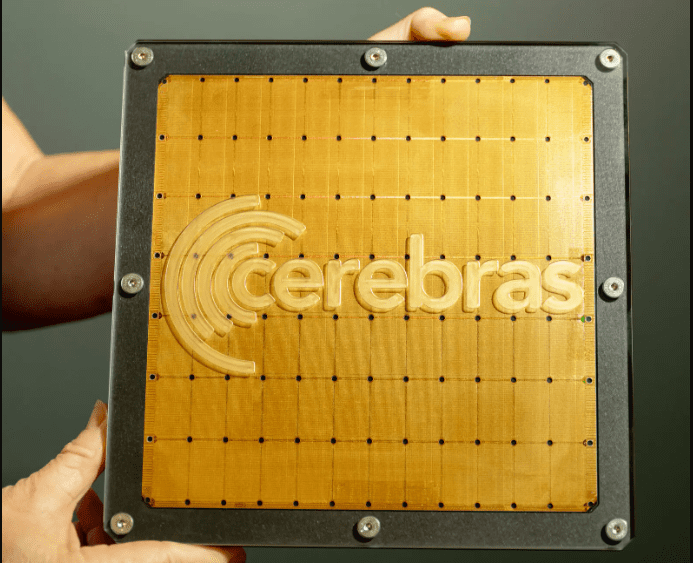TL;DR:
- Cerebras, a Silicon Valley start-up, reveals a new supercomputer built with their specialized chips, designed for AI products.
- Each Cerebras chip’s size is comparable to a dinner plate, offering 56 times the capacity of a standard AI chip.
- G42, an AI company in the Middle East, partners with Cerebras to use the supercomputer for AI product development.
- The global demand for AI chips has surged, leading tech giants and start-ups to compete for specialized chip technology.
- Cerebras aims to build more supercomputers for G42, forming a network known as Condor Galaxy.
Main AI News:
In the heart of Santa Clara, California, a groundbreaking event unfolded within the walls of a one-story building. The stage was set for the debut of an awe-inspiring supercomputer, brought to life by Cerebras, a dynamic Silicon Valley start-up. This cutting-edge marvel, powered by the company’s specialized chips, was unveiled just last month, representing a major leap forward in the realm of artificial intelligence.
Unlike its counterparts, Cerebras’ chips are truly exceptional, boasting a size akin to a dinner plate – a staggering 56 times larger than the standard AI chips. Moreover, each Cerebras chip harbors the computing prowess of hundreds of traditional ones, offering an unparalleled advantage in the race to revolutionize AI.
The brainchild of Cerebras, this extraordinary supercomputer was tailor-made for G42, an ambitious AI company with grand visions for the Middle East. Andrew Feldman, the visionary Chief Executive of Cerebras, expressed their ambition to demonstrate the boundless possibilities achievable with a massive and dedicated AI supercomputer. Faster, energy-efficient, and cost-effective – this is the trifecta that the start-up seeks to prove to the world.
The demand for computing power and specialized AI chips has reached meteoric heights this year, fueled by an explosive AI boom sweeping across the globe. Giants like Microsoft, Meta, and Google, along with a myriad of enterprising start-ups, have raced to unleash their own AI products after witnessing the viral success of ChatGPT, an eerily humanlike chatbot powered by AI.
Unleashing the potential of AI products, however, necessitates substantial computing power and specialized chips, sparking intense competition for these coveted technologies. Leading the pack is Nvidia, a prominent chip manufacturer for AI systems, whose market value soared above $1 trillion due to the insatiable appetite for their graphics processing units (GPUs).
In this scramble for AI chips, major tech companies such as Google, Amazon, Advanced Micro Devices, and Intel have taken matters into their own hands, developing alternative solutions to secure their supply. Simultaneously, a host of ambitious start-ups, like Cerebras, Graphcore, Groq, and SambaNova, have entered the fray, aiming to challenge Nvidia’s dominion in the market. These chips hold such significance in the realm of AI that they have the potential to reshape the power dynamics among tech giants and even nations, leading to considerations of national security implications.
AI supercomputers are not entirely novel, as Nvidia has already demonstrated its prowess in this arena. However, what sets Cerebras apart is its unique status as a start-up, daring to take on this audacious endeavor.
Based in Sunnyvale, California, Cerebras emerged in 2016, led by Mr. Feldman and four other visionary engineers, determined to accelerate AI development through innovative hardware. Over the years, they have raised a staggering $740 million from notable backers like Sam Altman of OpenAI and venture capital firms like Benchmark, catapulting the company’s valuation to an impressive $4.1 billion.
What truly sets Cerebras’ chips apart is their sheer size, as they far surpass the dimensions of typical AI chips, often no larger than a postage stamp. This substantial form factor allows Cerebras’ chips to train AI systems at unprecedented speeds – a colossal 100 to 1,000 times faster than existing hardware.
The prestigious Abu Dhabi-based company, G42, joined forces with Cerebras in 2021. Utilizing the power of a Cerebras system, G42 successfully trained an Arabic version of the sensational ChatGPT in April. Impressed by the capabilities of Cerebras’ technology, G42 subsequently commissioned them to construct a network of supercomputers worldwide, destined to unlock new frontiers in chatbot development and empower AI for analyzing genomic and preventive care data.
However, the demand for GPUs was reaching a fever pitch, making it increasingly difficult to acquire enough for constructing the supercomputer. This is where Cerebras’ technology shined, offering a readily available and cost-effective solution. In an astonishing feat, Cerebras utilized its chips to construct the supercomputer for G42 in a mere ten days, dramatically reducing the typical time frame for such endeavors.
Looking ahead, Cerebras envisions crafting two additional supercomputers for G42, with one stationed in Texas and the other in North Carolina. Afterward, they plan to establish six more of these extraordinary machines across the globe, forming the ambitious network known as Condor Galaxy.
Conclusion:
Cerebras’ groundbreaking AI supercomputer, fueled by specialized chips, marks a significant milestone in the AI market. With the soaring demand for computing power and specialized chips, tech companies are aggressively competing to secure their supply. As Cerebras and other start-ups challenge Nvidia’s dominance in the market, the dynamics among industry players are set to shift. This fierce competition will likely drive further innovation and advancements in AI technology, shaping the future landscape of the market.

